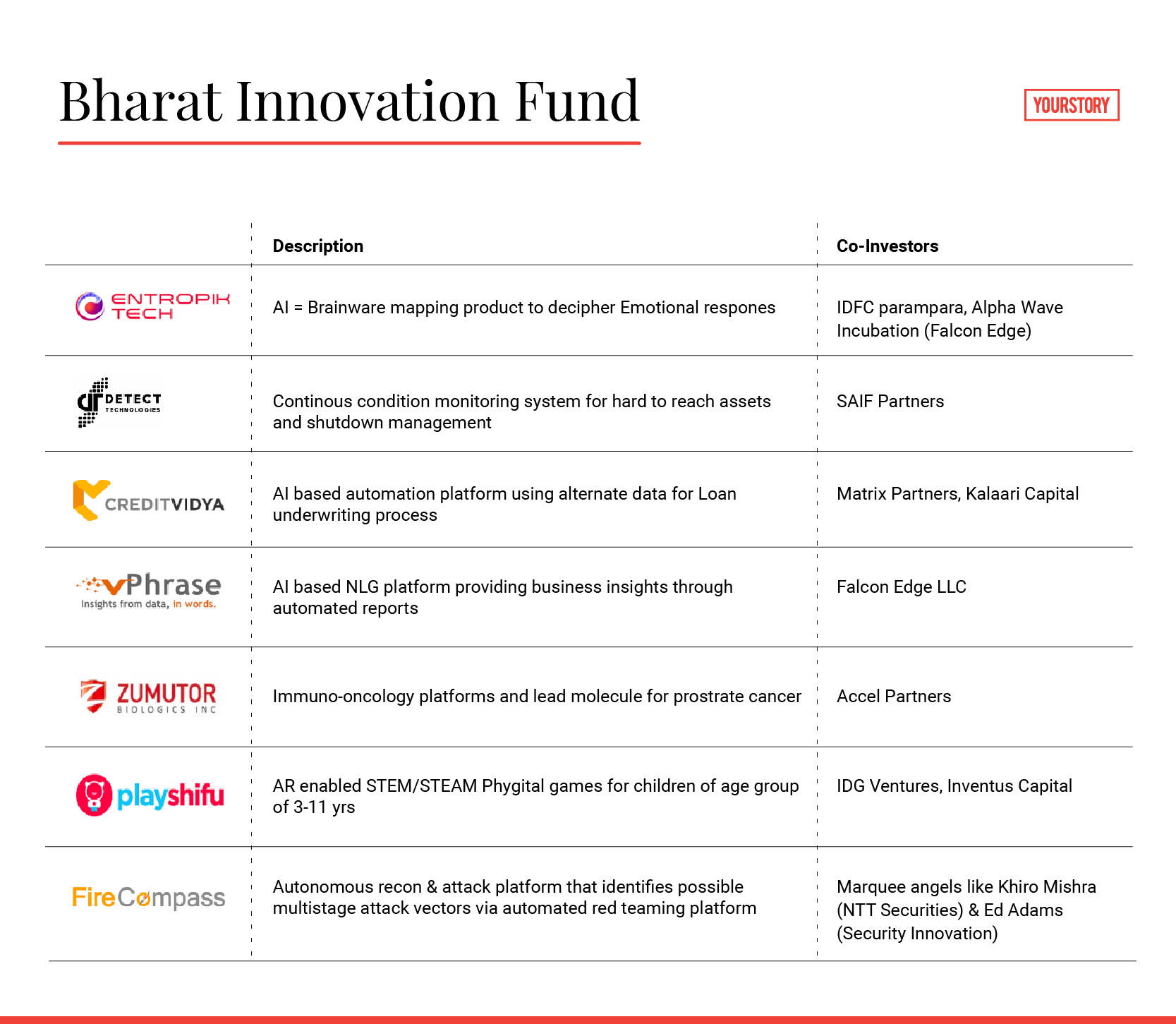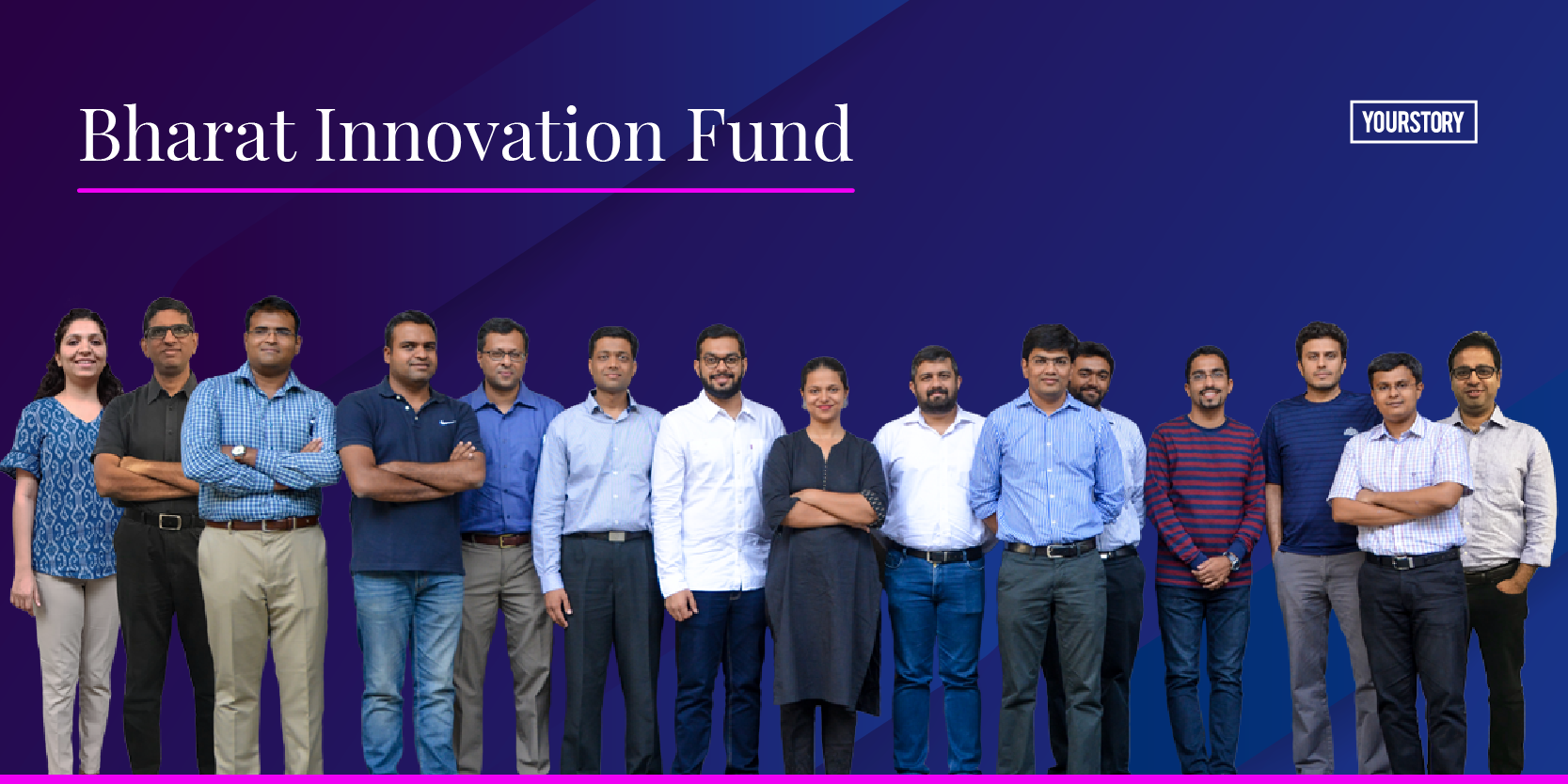Raising early-stage funds is an uphill climb for deeptech startups. The first product is often expensive to build and takes years to launch. Not many are willing to back these bold startups until the breakthrough of the technologies they are building.
This marked the inception of IIM Ahmedabad’s Centre for Innovation Incubation and Entrepreneurship (CIIE)-backed early-stage venture firm Bharat Innovation Fund (BIF) in 2018.
The idea of curating BIF was to provide pre-Series A and Series-A funding to deeptech and IP-focussed startups, who otherwise remain outside the profile and deal flow of most Private Equity (PE) funds at their initial stages.
This three-year-old category-I Venture Capital (VC) firm has so far funded seven deeptech startups, and has made several other undisclosed investments in tech infrastructure/inclusion solutions, deploying almost 40 percent of its fund pool of $100 million.
The fund has secured commitments from institutional investors like SIDBI (Fund of Funds), ICICI Lombard, SBI Life, RBL Bank, Federal Bank, and corporates such as Philips and Bajaj Electricals along with global entrepreneurs, family offices, and HNIs.
The foundation of BIF
Constituted in 2018, BIF is a deeptech-focussed venture fund that traces its origin in IIM Ahmedabad’s incubation centre CIIE.CO, which was started by Kunal Upadhyay in 2005.
Kunal, along with co-founder Shyam Menon, went on to launch a clean-tech focused venture fund — Infuse Ventures, followed by Bharat Inclusion Seed Fund and Bharat Innovation Fund, all under the CIIE.CO umbrella.
Additional three partners — Ashwin Raguraman (former COO of India Innovation Fund), Sanjay Jain (former Chief Product Manager at UIDAI and Chief Innovation Officer at CIIE.CO), and Som Pal Choudhury (former Managing Director of Analog Devices, India) later joined BIF.
Kunal says the idea of setting up BIF came from two broad thematic areas that were emerging out of the Indian startup ecosystem.
One was the creation of solutions that can have impact on the masses and not restricted to just the creamy layer, and second were solutions for the world coming out of India.
“India was sitting on a phenomenal amount of data, tech infrastructure, and global R&D centres, which made it uniquely poised to make product innovations for the world and create solutions for Indian masses that use technology,” the founder says.
Identifying gaps in both the opportunities, the team decided to set up BIF to back startups under these two specific themes.

The ‘patience’ capital
Owing to the long gestation period, not many investors are willing to invest in deeptech startups, and usually come in the later life cycle.
It frequently requires larger capital investment; state-of-the-art R&D facilities; a large network for strategic partnerships with prospective manufacturers, suppliers, and customers; and a long incubation period to build products.
“The easiest opportunity in India today is consumer tech (D2C), but the biggest opportunity is deeptech. We have an opportunity to become a world leader in providing deeptech solutions, but not many investors are willing to put in their money in the initial stages,” says Kunal.
He narrates the story of one of BIF’s Chennai-based Industrial Internet of Things (IIoT) startup, DeTech, which struggled to find investors across the country.
The IIT Madras incubated startup was engaged with the CIIE.CO accelerator and received an initial funding of Rs 1 crore and subsequently hit a roadblock in its development stage.
“Despite coming out of the world’s top labs, no fund in India was willing to invest in the venture as the gestation period was long. This is the gap that we want to fill in with our specific stage fund (pre-Series A and Series A) that pushes the startup to the level where its market is developed,” says Kunal, adding that BIF’s investment band typically ranges between $0.5 million to $2-3 million.
The situation is, however, improving as the overall flow of funds into the Indian startup ecosystem spurts and the subsequent emergence of specialised or micro VC funds that are focussed on investing in niche areas.
One of the early movers in the space is Bengaluru-based Pi ventures (2016), which has invested in 13 deeptech and AI-focussed startups, and has had one exit to date.
On the other hand, early-stage VCs like BIF (2018), 100X.VC (2019), Inflexor Ventures (2019), and ArtPark (2021) are aggressively expanding their deeptech portfolio and the fund pool.
The investment thesis
The 15-member team at BIF rigorously analyse and focus on three core areas – the market, team, and technology, before signing the cheque. The startup selection process is “quick and nimble”, says Kunal.
The firm has a dedicated team that does the first-level evaluation of the startup profile/pitch. It is then handed over to the investment committee where the final decision is made.
While undertaking due diligence, BIF considers four key areas -- the product-market-fit; the market potential -- nascent market but rapidly growing and has the potential to be large or large existing market with a disruptive play or discontinuity; a strong value proposition, scalability, and defensibility; and a strong team to see if it has the appetite and the ability to go global.
A majority of startups hit the roadblock when it comes to their understanding about the market, says Kunal. He emphasises that a startup needs to pick up the right market, some of which might not even exist today, but have a future potential.
He continues with the example of DeTech and explains how the startup found its market fit in the oil and gas sector much later and saw significant interest from investors like Accel Partners and Elevation Capital in their subsequent rounds. The company’s current portfolio includes industrial giants such as Shell, Tata Steel, ExxonMobil, Adani Group, and several Fortune 500 companies.
“The market, technology innovation, and sustainability of the startup needs to be in alignment with us. We take a punt on the team, tech, and market, and see if the startup understands the IP. We also look at the changing market dynamics and the ecosystem,” says Kunal.
Emphasising on the understanding of the IP, the founder says that deeptech is being loosely used these days.
“AI is not deeptech. Creation of IP from deep research is important rather than mere usage of AI, which is an after effect,” he adds.

Bharat Innovation Fund team
De-risking a startup
BIF has already built up a significant portfolio of seven investments, which includes credit-scoring platform CreditVidya, emotion recognition startup Entropik Tech, industrial Internet of Things (IIoT) startup DeTech Technologies, AR-enabled toymaker PlayShifu, and data analytics platform vPhrase.
Risk is inherent to a startup, but when it comes to deeptech, the chances of survival and the perseverance needed is at a different level altogether, explains Kunal.
“The right strategic guidance is extremely important for startups along with mitigation of technology, regulatory, and execution risks. Since the gestation period is long, we have to make sure the startup reaches a certain milestone, de-risks, and additional investors come on board,” he says.
The big umbrella
BIF has been built on a decade-long startup engagement experience of CIIE.CO, which has been leading accelerator programmes and seed-funds in India since 2008 with support from Tata Trusts and partners, including Department of Science and Technology (DST), ADB, GIZ, Michael & Susan Dell Foundation, Bill & Melinda Gates Foundation, SAP, CISCO, JPMorgan, MetLife foundation, Siemens, Bosch, Castrol, HDFC bank, Mahindra Finance, Godrej, BP among others.
Each fund, including BIF, or a programme draws the advantage of the much-bigger backend engagement of CIIE.CO with institutions, corporates, and government.
“CIIE works as the engine running at the backend. We have branded our funds (BIF, Infuse Ventures, Bharat Inclusion Seed Fund) differently, but they all are managed under CIIE.CO. The intent is to build an ecosystem for startups across emerging and upcoming sectors,” says Kunal.
The opportunity ahead
India has the potential to cradle deeptech for the world, says Kunal, who bets on the growing innovation in sectors like healthtech, spacetech, enterprise tech, and biotech. The firm has already lined up two investments in spacetech and is actively looking for more ventures.
“Global game-changing products will come out of deeptech. It's a multi-billion dollar opportunity and we are backing game-changing innovations that will be made in India, for the world,” says Kunal.
According to a Nasscom-Zinnov report, over 2,100 Indian startups have adopted deep technologies in 2020, up from 1,600 in 2019. Over 14 percent of the total startup investments went into deeptech ventures, which is 11 percent higher than in 2019. The report further highlights that deeptech will continue to grow at a CAGR of 40-45 percent in 2021.
“In the next 10 years, at least a 100 deeptech globally changing companies of consequence, which will go on to become unicorns, will come out of India,” says Kunal.
YourStory’s flagship startup-tech and leadership conference will return virtually for its 13th edition on October 25-30, 2021. Sign up for updates on TechSparks or to express your interest in partnerships and speaker opportunities here.
For more on TechSparks 2021, click here.
Applications are now open for Tech30 2021, a list of 30 most promising tech startups from India. Apply or nominate an early-stage startup to become a Tech30 2021 startup here.
Edited by Megha Reddy
Link : https://yourstory.com/2021/08/bharat-innovation-fund-deeptech-startups
Author :- Naina Sood ( )
August 27, 2021 at 05:15AM
YourStory


